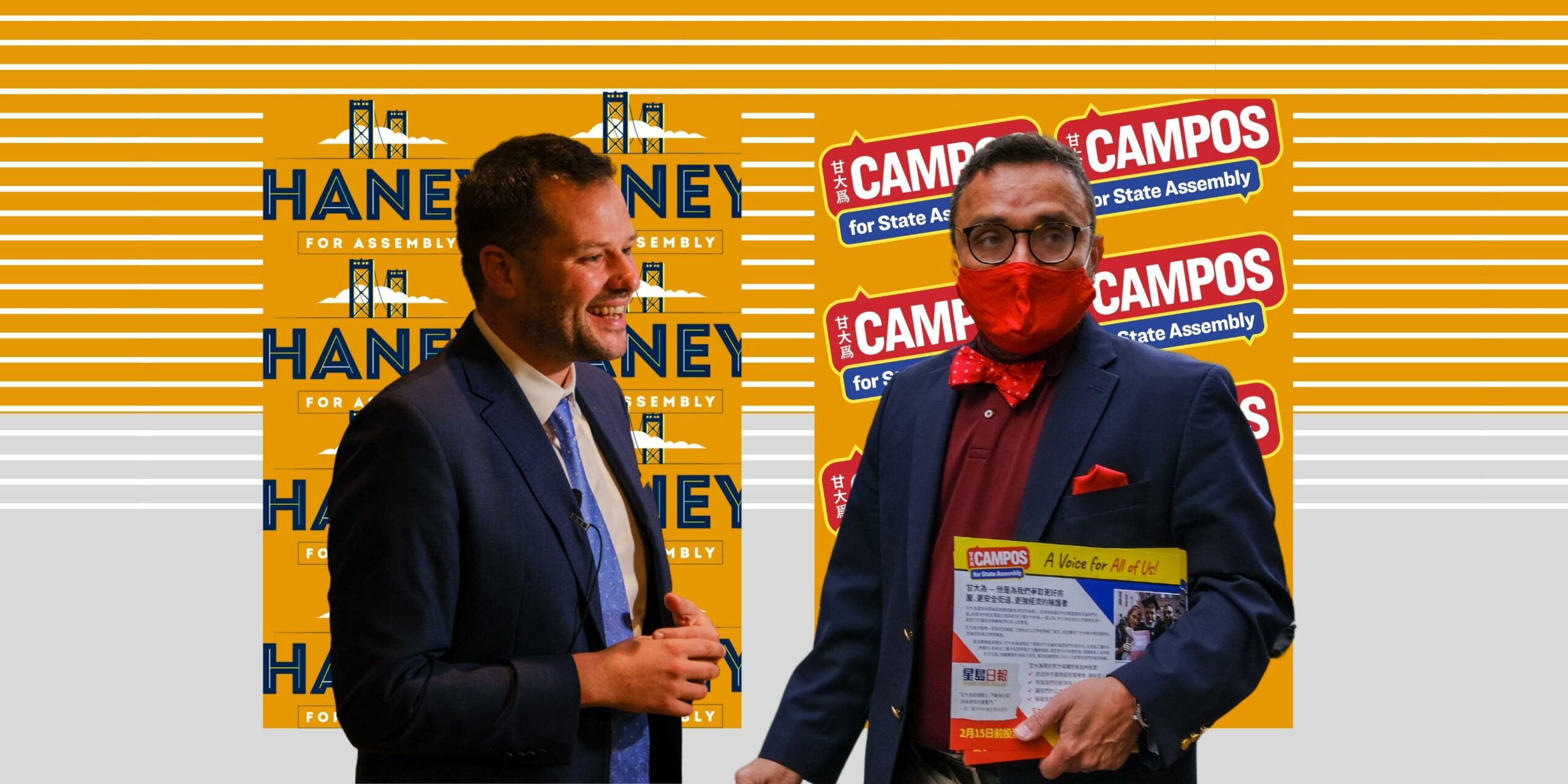The special election primary for the state Assembly’s District 17 seat is in the books (mostly), and a runoff is scheduled for April between top vote-getters Supervisor Matt Haney (24,422 votes, 37%) and former Supervisor David Campos (20,985 votes, 35%). Below are some of the key questions to consider in the two months between now and the runoff:
Q: How did the primary results for the Assembly District 17 special election change the calculus for politics in San Francisco?
It didn’t, oddly. While Bilal Mahmood, a tech entrepreneur and political newcomer, clocked an impressive showing with 20% of the vote, his efforts ultimately didn’t make a dent in the success of the two frontrunners, veteran progressive Campos and current SF Supervisor Haney. April’s runoff looks to be a typical San Francisco battle between institutional powers.
Honey Mahogany, chair of the San Francisco Democratic Party, said the party won’t make an endorsement in the state-level race. But she expects the Alice B. Toklas Democratic Club, on which she serves as PAC co-chair, to take a position now that the field of candidates has narrowed.
“I do think that Matt Haney will have a better chance at getting that endorsement given the broad coalition he’s built across the city,” said Mahogany, who is publicly supporting Haney in this election and has worked as his legislative aide.
Q: What effect will Mahmood’s campaign have on the runoff?
Jason McDaniel, associate professor of political science at San Francisco State University, says Mahmood “outperformed expectations” in the primary “but has no coattails. … His endorsement will matter but won’t have the same traction” as some others. McDaniel’s analysis is that Mahmood is a newcomer and his supporters are not as committed as those who voted for Haney or Campos.
Haney told The Standard that he spoke with Mahmood and congratulated him on his showing and noted issues they have in common, such as housing and guaranteed income. Haney said he expressed hope they will work together on those issues.
It will be interesting to see if Mahmood’s supporters—such as the Eastern Neighborhoods Democratic Club, Noe Valley Democratic Club, and GrowSF—now throw their weight behind Haney.
It’s also still possible that Mahmood will run in June’s general election for this same seat, so his endorsement—if he gives one—may be made with that decision and who he’d rather face later this year in mind. In a statement on Wednesday, Mahmood did not give any endorsement and left the door open to run again in June.
“Just because we weren’t successful on Election Day, we’re not going anywhere,” Mahmood said.
Campos said he hopes to attract Mahmood voters with his policies on issues like public safety in the Tenderloin.
“Ours is a message for change,” Campos said. “Those voters want someone who can not only talk about change but deliver.”
Q: How can Campos win the race?
It’s not yet clear how the lines will be drawn as far as endorsements for the AD 17 runoff, but Campos got the most endorsements for the February election. That didn’t always translate to money, however. Haney, meanwhile, got ample financial support from super PACs.
Campos told The Standard on Wednesday that his results—in particular, his strong showing in votes cast on election day—despite taking no money from corporate interests and hundreds of thousands spent against him will set his campaign up for success.
“They were looking for a knockout punch last night, and it didn’t happen,” Campos said.
But with Haney’s support from labor groups, Mahmood’s votes up for grabs and super PAC spending expected to continue to roll in his favor, the supervisor’s campaign could have a leg up in what is expected to be another low-turnout election.
“I think it really is a game of who can turn out the most voters,” Mahogany said.
Q: What kind of Assemblymember should we expect Haney or Campos to be at the Capitol?
In classic San Francisco form, the two candidates are both progressives, but they still disagree on how things should be done.
Campos is focusing on broader progressive policies like Medicare for All and a better living wage, while Haney is focusing on kitchen table issues like housing costs and homelessness.
In a recent clash on an affordable housing project on Stevenson Street that was denied by the Board of Supervisors, Haney and Campos fell on opposite sides of the issue. Haney supported the project while Campos wrote on his campaign website that the project was “not good enough.”
“The Stevenson vote is exemplary on how these two candidates differ,” Mahogany said.
Q: How could the recall on District Attorney Chesa Boudin affect the AD 17 race between now and April 19?
It looks like neither side gains anything from direct association with the district attorney recall, despite Campos’ work as a chief of staff to DA Boudin. McDaniel said that the politics of the recall “should not affect the race much,” but “if Campos is put in the position of defending Boudin’s policies publicly, then maybe.”
That said, things may be different in certain constituencies. The District Attorney recall campaign has significant vocal support in the Asian American community, which has been targeted by pandemic-inspired hate crimes. It’s here where Campos’ ties to Boudin, which he has already tried to downplay, could be a real liability.
Campos said he hopes his—not Boudin’s—record on public safety, including his time on the police commission, will dominate the conversation come April.
“San Franciscans believe it’s possible to have both safety and reform,” Campos said.
Correction: An earlier version of this article incorrectly stated that the United Democratic Club had endorsed Bilal Mahmood. They did not make an endorsement for the February vote.
